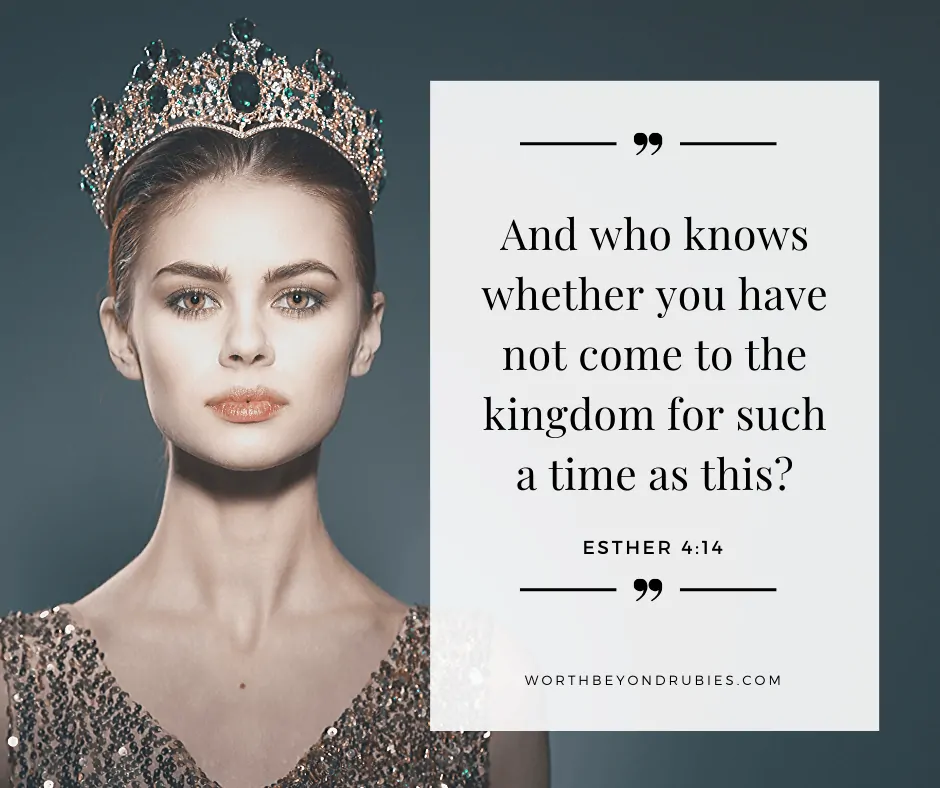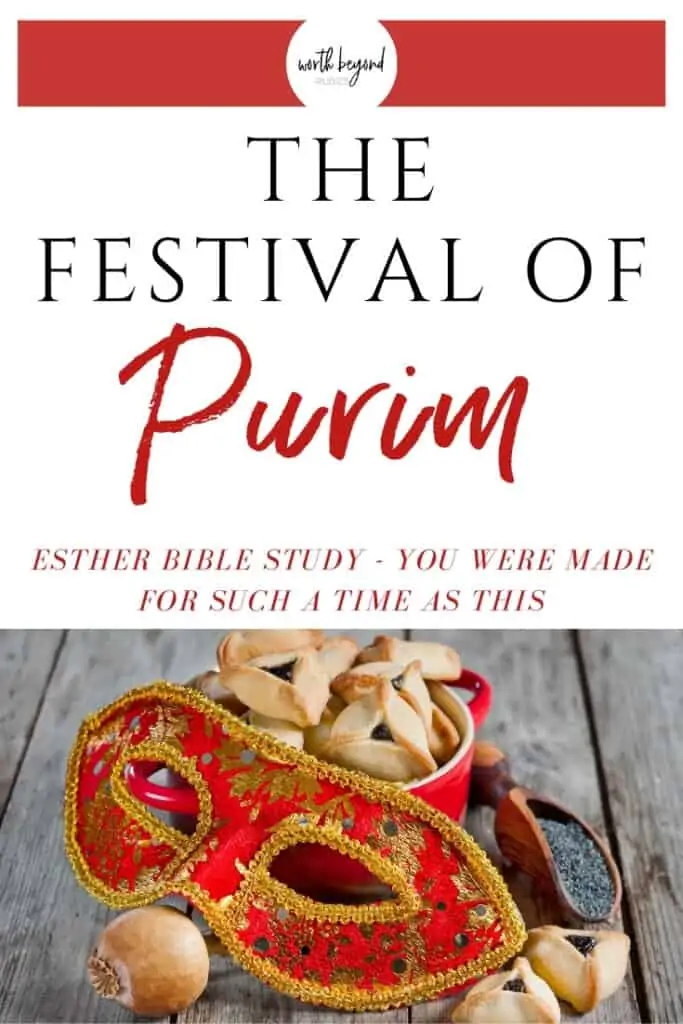Esther Bible Study – 10 Lessons From the Book of Esther in the Bible
Please note that this article may contain affiliate links. As an Amazon Associate, I earn on qualifying purchases at no additional cost to you. You can read more at the bottom of this page or read my full disclosure on my Affiliate Disclosure Page
In this Esther Bible Study, we explore the amazing story of how God used one woman to save the Jewish people and the lessons we can learn from her.
This ancient text might seem like a distant story, but trust me, it’s packed with timeless lessons that speak right to us today.
Let’s journey together through Esther’s story. From courage to wisdom, from unexpected twists to divine guidance, we’ll uncover ten powerful lessons that will enrich our lives and deepen our understanding of faith.
Ready to discover what Esther has to teach us?

Lessons About Esther’s Character
Esther in the Bible is a woman of courage and faith. As a Jewish believer myself, she is one of my favorite Biblical figures because of her love for her people and her faithfulness to her God.
In fact, my Hebrew name is the same as the Hebrew for Esther: Hadassah.
In this study, we will look at her lessons of faithfulness and God’s goodness in placing Esther where she needed to be in order to preserve the Jewish people.
She was taken to live in the palace of the King of the Persian Empire as a teenager, given all the things in life she could want. But she never forgot her people or her God when she became Queen of Persia and she ultimately save her people from annihilation.
You may be familiar with the famous phrase we read in the Book of Esther, “Perhaps you were made for such a time as this” (paraphrased of course). Well, she most definitely was.
So let’s look deeper into Esther and the lessons we can learn from her.
10 Biblical Lessons from the Book of Esther We Can Learn
As we explore this Esther Bible study, let’s look for these 10 lessons from the Book of Esther that we can learn from as we go through her story:
- Never assume you are too insignificant for God to use!
- You can step out in faith, trusting that God can equip you with the courage you need, when you need it!
- God has a plan and a purpose for you!
- Doing what is right is more important that doing what is easy!
- When confused or conflicted about a decision, prayer and fasting can bring you the answers you need!
- Never forget where you came from!
- God can use what is bad for the good!
- Prepare to make sacrifices!
- Let the beauty within you shine for all to see!
- Unity is strength! We are stronger together!
The 10 Amazing Characteristics of Esther in the Bible
Let’s also look at 10 characteristics of Esther in the Bible and see what we can learn from them and how to apply them to our own lives as we explore her story:
• Like Esther, we can overcome difficulties
• Like Esther, it’s important to be humble and gentle
• Like Esther, we have the power to influence others for good
• Like Esther, we should have a desire to please God before all else
• Like Esther, we can learn how to overcome obstacles
• Like Esther, we can find new perspectives on life’s challenges, when we focus on others
• Like Esther, we can gain confidence in God’s protection and provision and have gratitude for what we have been given• Learn how to overcome obstacles
• Like Esther, we can trust the Lord for wisdom
• Like Esther, we can exhibit patience and not act rashly
• Like Esther, we can have faith that ultimately God is in control and we can trust Him
These 10 characteristics of Esther are what we should seek to have in life. So, let’s learn more about this amazing woman!
Who Wrote the Book?
It is widely believed, due to the following quotes from the Book of Esther, that both Mordecai AND Esther wrote this Book.
Esther 9:20 says:
“Mordecai recorded these events. And he sent dispatches to all the Jews throughout the provinces of King Ahasuerus, near and far,”
And Esther 9:29 says:
“Then Queen Esther daughter of Abihail wrote a second letter of Purim for the purpose of confirming with full authority the aforementioned one of Mordecai the Jew.”
When read literally from the Hebrew, verse 29 reads more like:
“Then Queen Esther, daughter of Abihail, and Mordecai the Jew, wrote with full authority to confirm this second letter of Purim.”
Chabad also states that Esther and Mordecai wrote the Book of Esther, but that it was essentially secular (which is why it makes no mention of God) and was to be more of a historical account.
But the Great Assembly edited the writing:
A simple explanation is that it was actually written twice. Esther and Mordechai recorded the story of Purim shortly after the events happened. With G-dly inspiration, they were able to thread together the entire story, showing the Divine orchestration throughout the approximately nine years of the Purim story.
However, their manuscript lacked holiness. It was just a historical record of events. In fact, according to some, this is the reason the Book of Esther doesn’t contain any reference to G-d. Mordechai and Esther knew that the Persians would take this account and include it in their history books, but would substitute the name of G-d with the names of their own deities. They, therefore, decided that it was more respectful to G-d to just leave His name out.
Later, Queen Esther petitioned the sages to have the Book of Esther included as part of the 24 holy books of Scripture. The Men of the Great Assembly then rewrote it with Divine inspiration, and it was included as one of the 24 books of Scripture.
Only after it was rewritten by the Men of the Great Assembly could we parse and expound on every nuance, such as the sizing of certain letters. (Chabad)
Queen Esther – The Backstory
First, in this Bible study, we need to delve into what led Esther to the palace to begin with. So let’s first look the story of Esther before she became queen!
In the 3rd year of the reign of King Ahasuerus (sometimes called King Xerxes), the king made a feast for himself, his officials, servants, nobles. The king reigned over 27 provinces in the Persian Empire so you can only imagine how elaborate this feast was.
He had spent 128 days showing off his kingdom and then held the feast!
He went all out; the finest furnishings, wine served in golden cups where no two were alike!

You can find everything that you are looking for in an Esther Bible Study and the Festival of Purim in this ebook copy of this article! No ads, no pop ups and you’ll have it forever to refer to whenever you would like. The best part – it’s only $3 (to cover hosting expenses)
Queen Vashti
The king had a beautiful queen named Vashti. She also gave a feast in the palace for the women at this time.
On the 7th day, the king ordered his eunuchs to bring Vashti before him with her crown on her head. He wanted to show off his queen and her beauty!
But, Vashti refused to be summoned. She did not come to the king.
The King’s Dilemma
The king has a real public relations dilemma on his hands here! How can he respond to this obvious (and very public) refusal?
He speaks to his wise men who, the Bible tells us, are all too familiar with the king’s temperament. He asks them what to do about Queen Vashti.
The wise men remind the king that basically everyone witnessed this refusal and if this was not dealt with then all the women will think they can just go around defying their husbands! They felt it would be a situation of “well if the queen did it, so can we!”
So they suggest to the king that she be cast out and stripped of her role of queen and of the royal crown.
The king agrees and he then sends a letter out to everyone making sure that it is understood by all that basically the man is the master of his home!
Enter Queen Esther
So now the king is short a queen and he decides he needs to find a new queen.
So in this sort of an ancient version of The Bachelor, he chooses to essentially have a pageant of sorts. All these beautiful women from across his kingdom are brought in to the women’s quarters in Shushan in the citadel, given beauty treatments, and would each appear before the king.
Esther’s Background
So let’s revisit who Esther was now that we have explored the story a bit more in a bit of a summary:
She was a Jewish woman and again, Esther’s Hebrew name was Hadassah, which means Myrtle tree. Esther was the cousin of a man named Mordecai who lived in Shushan.
Esther had lived with her cousin Mordecai since she was a little girl due to her having been orphaned. The Bible doesn’t give us much more information about Esther’s past than that. It was with Esther’s future that the Word concerns itself.
Esther was one of the women chosen to be taken and placed in the care of one of the eunuchs who was in charge of all the women. Mordecai had warned Esther not to reveal that she was a Jew. He knew it would not bode well for her if it was known she was a Jew.
It was as though Mordecai knew having a Jewish queen in place would be ‘for such a time as this’ just when the Jewish people needed her most. His wisdom proved to be what saved the Jewish people ultimately.
She became a favorite of Hegai the eunuch so he ensured she received the finest treatment, including beauty treatments beyond what the others received. God had bestowed favor on Esther.
She finally appears before the king who loved her above the others and he crowns Esther as queen. Esther’s beauty and her demeanor had won the king over.
Who Was Haman?
Haman was a trusted and highly esteemed official in the court of the king and he had received a great promotion and high position. He was above all of the king’s court and essentially number two in the kingdom.
Some time later, Mordecai was told of a plot by two of the king’s eunuchs to kill the king. Hee relayed this information to Esther, who then tells the king of this plot on behalf of Mordecai.
Everyone would bow down to Haman, but not Mordecai. Mordecai only bowed before God.
When Haman learned of this he was outraged that Mordecai would disrespect him in that way. He also learned that Mordecai was a Jew, so Haman hatched an evil plan and plotted to kill, not only Mordecai but ALL the Jews!
Lots (known as “purs”) were cast to determine the day that this plot would be carried out. It was to be the 13th day of Adar.
Then Haman goes to the king to inform him of these people, the Jews, who set themselves apart from the people and the king’s laws. He basically paints them as being rebellious against the king and his rule.
He convinced the king to destroy God’s people by paying people a bounty for killing them!
Letters were sent out, sealed with the king’s signet, to all the provinces instructing them to destroy, kill, and completely rid the land of the Jews regardless of age or gender.
Esther Learns of Haman’s Plot
Mordecai learns of this decree and he tears his clothes and puts on sackcloth and ashes, a sign of deep mourning or sorrow as well as an act of humility and repentance before God, and then he goes out into the city.
News reached Esther of her cousin so she sent clothes to Mordecai to remove his sackcloth but he refused to accept the clothing.
Esther sends one of the king’s eunuchs to find out what was happening and why Mordecai was in sackcloth and ashes.
Mordecai tells the eunuch of the plot and gives him a copy of the decree. He asked for Esther to go in before the king to plead for the life of her people.
But Esther sent a message to Mordecai to remind him that anyone who goes to the inner court of the king without being summoned was to be put to death. What good would she be to her people if she was put to death for even approaching the king without being called?
Perhaps You Were Made For Such a Time as This
Mordecai sends word to maybe ‘not so gently’ remind HER that she too is a Jew and she is also a target of this decree. In more direct terms, he was letting her know she too was dead if she DIDN’T go before the king.
The palace and her position offered her no protection. The king could not defy his own decree if it was discovered that Esther was a Jew regardless of being queen.
Mordecai also sends her word, and you can almost hear his chastisement of Hadassah, that God may in essence very well send help to the Jews in some other way, but that help will not reach her nor her family legacy if she fails to take action.
He reminds her that God may have placed her in the role she is in for such a time as this!
Esther 4:13-14
“Don’t suppose that merely because you happen to be in the royal palace you will escape any more than the other Jews.
CJB
For if you fail to speak up now, relief and deliverance will come to the Jews from a different direction;
but you and your father’s family will perish. Who knows whether you didn’t come into your royal position precisely for such a time as this.”

Mordecai was letting her know that the fate of the Jewish people, including her own life, had been placed in her hands.
This exchange is at the heart of this Bible study because it applies to us today as well.
You too were made for such a time as this. For such a time as right now.
Do we look at where God has us placed at this very moment, at our trials and difficulties, and wonder if He is using us for such a time as this as He did with Esther in the Bible?
Oh to have that faith in all we go through!
So Queen Esther chooses to go to the king. She tells Mordecai to go to all the Jews in Shushan and have them fast for her, as she would also be doing, and if she dies going before the king then so be it.
Mordecai reminded Esther that God may have placed her in the role she is in for such a time as this! Click To TweetQueen Esther’s Banquets
Esther goes into the king and the Bible tells us she found favor with him. He wasn’t angered by her appearance before him without being summoned.
In fact, he even asks her what she would like from him, up to half the kingdom, and she tells him she would like to invite him and Haman to a banquet.
Haman’s narcissistic ego certainly was piqued by her request and the king and Haman attend this banquet.
The king enjoys the banquet Esther prepared for them thoroughly and asks her again, what would she like from him. She tells him she would like them to attend another banquet to be held the next day.
They agree.
Haman’s ego is now on full throttle and he runs and tells ALL his friends and family that, other than the king, Esther invited no one else but Him.
However, on his way home to tell them this news he runs into the man he hated more than anything else; Mordecai.
Haman tells his friends and family that regardless of ALL his good fortune, it is ruined by the sight of Mordecai! Just the mere sight of him was enough to deflate this haughty giddiness Haman felt.
So Haman and his family, at the suggestion of his wife, erect these extreme gallows (50 cubits high!!), and tell him that he should suggest to the king that Mordecai be hanged on it and then go on and enjoy the banquet!
Honoring Mordecai
However, insomnia would prove to be Haman’s undoing.
You see, that night the king has a tough time sleeping so he calls for his book of records to be brought in and read to him! That would put me to sleep too!!
And when it is read to him, it revisits the time the plot to kill the king was discovered and revealed by Mordecai, saving the king’s life.
The king then asks his officials what was done for Mordecai for this act that saved the king from the assassination plot. He is told nothing had been done for Mordecai.
So he summons none other than Haman, who was in the court at the time, and, without mentioning Mordecai by name, asks Haman what should be done to honor a man.
Haman, in all his great narcissism, assumes it could be no one but him!
So he tells the king that a royal robe that had been worn by the king, and a horse which the king had ridden that has a royal crest on its head be brought to that man.
He said the man should be paraded before all the people in the city so everyone can see how much the king honors him.
So the king tells Haman to hurry and go do all these things for the Jew, Mordecai!
Can you just picture the look on his face when he heard this?
Not only did Haman have to witness this being done for Mordecai, but he had to lead him through the city himself!!
Oh, I can only imagine his rage!
Lessons From Esther – The Defeat of Haman and the Saving of the Jewish People
Haman, like a jealous child, goes home and complains to his family yet again! But his seething is cut short when the king’s eunuchs come to bring him to Queen Esther’s second banquet.
At the banquet, the king asks her again what she desires from him and Esther begins to tearfully beg and plead for her life and the life of her people because…
“For we have been sold, I and my people, for destruction, slaughter and annihilation.
Esther 7:4 TLV
If we had simply been sold as male and female slaves, I would have remained silent, for such distress would not be worth disturbing the king.”
The king demands to know who would DARE to think to do this to his queen and her people and Esther points at Haman!
Haman is then taken away and hanged on the very same gallows that had been erected for Mordecai. His family is executed, as are thousands of would-be attackers.
The king then gave all that had belonged to Haman to his Queen Esther and appointed Mordecai over the House of Haman.
Purim was mandated to be commemorated each year!
Haman was defeated and the Jewish people saved!
While this is the only book of the Bible that doesn’t mention God’s Name, we certainly see Him throughout this narrative in His saving work of His people by placing Hadassah at the right place at the right time.
What can we learn from This Amazing Story of Esther?
Esther Regarded Others Over Herself
What can we learn from this Old Testament story that some people overlook?
Esther is in the Bible for a very important reason. She was the queen of Persia. Esther was born into a Jewish family. The Jewish people were a minority in Persia as a result of the exile. It wasn’t uncommon for minorities to be belittled or looked down upon. But God had great plans for her.
Esther, after ascending to the throne, decided to use her influence and power for good. She risked her own safety and position. What’s even more interesting is that she did this even when she could have easily allowed this genocide while protecting her own safety or well-being. She could have let fear prevail. But her faith in God gave her the courage that they needed to stand up against an entire kingdom.
After very personal examination, this book has taught me that God can take even the worst of times and turn them into beautiful moments of life! When I find myself at my lowest, I need to remember that I am still priceless because God loves me, and He will make all the messes in my life into masterpieces. He will give me beauty for ashes.
Isn’t it great to know that even if something bad did happen, God is waiting on the other side with arms wide open?
You Too Can Impact History
Hadassah was one young woman who changed the world. The survival of the Jewish people gave us our Messiah, Jesus.
One woman made a difference!
You, as a Christian woman, have tremendous value and strength. God can do amazing things through you no matter what life brings. Never doubt that He can use YOU just as He did Esther.
And never doubt your impact on other women. Always strive to share your struggles and victories with them as a Titus 2 mentor that can show them the value they hold.
Now let’s move on to the second part of our Bible studies and dive into the Festival of Purim and see why the Jewish people celebrate the amazing lessons we learn from the Book of Esther and her faithfulness.
The Festival of Purim
The festival of Purim is celebrated every year on the 14th day of the Hebrew month of Adar. It commemorates and celebrates the defeat of Haman’s plot, according to the Book of Esther (known as the Megillah):
“Letters were sent by courier to all the royal provinces “to destroy, kill and exterminate all Jews, from young to old, including small children and women, on a specific day, the thirteenth day of the twelfth month, the month of Adar, and to seize their goods as plunder.”
Esther 3:13 cjb
While Purim is celebrated on the 14th day of Adar, Haman’s plot to kill the Jewish people was actually the 13th day. In reality, Esther and Mordecai received a royal edict that allowed the Jews to attack their enemies on Adar 13.
They won the victory and so they declared that the following day would be a day of remembrance and celebration. Each year, the Festival of Purim serves as a reminder of God’s faithfulness to His people.
But read on to learn more at this post on the Purim Story!
The Festival of Purim
What is the Festival of Purim?
Purim means ‘lots’ in Hebrew, tying into the lots that were cast to choose the date to carry out the plot against the Jewish people.
The festival of Purim is a joyous holiday that celebrates and commemorates the saving of the Jewish people from the wicked Haman and his plot to annihilate them.
It is a day full of fun and celebration, but it is also a day of charity as it is written in Esther 9:22:
“…[to commemorate] the days on which the Jews obtained rest from their enemies and the month which for them was turned from sorrow into gladness and from mourning into a holiday; they were to make them days of celebrating and rejoicing, sending portions [of food] to each other and giving gifts to the poor.”
CJB
Visit this post to read more about the story of Purim and this amazing festival!
Tree of Life (TLV) – Scripture taken from the Holy Scriptures, Tree of Life Version*. Copyright © 2014,2016 by the Tree of Life Bible Society. Used by permission of the Tree of Life Bible Society.
CJB – Taken from the Complete Jewish Bible by David H. Stern. Copyright © 1998. All rights reserved. Used by permission of Messianic Jewish Publishers, 6120 Day Long Lane, Clarksville, MD 21029. www.messianicjewish.net.
Originally published December 27, 2019



I love reading about Esther. Thank you for sharing the traditions. Maree
Thank you!!!
Diane, I love learning from you. When I saw that we were neighbors today at #heartencouragementThursday, I immediately said, “Oh good! I love her posts.” Thank you for sharing about the Festival of Purim. How interesting! Esther was a brave woman. Mordecai even more so. What a champion of righteousness both were. But the topper of them all is God. We serve a faithful, faithful Father. Oh, how thankful I am. Enjoy His faithfulness today, friend.
Thank you so much my friend!! I love your posts as well!!! I actually just got ready for the day (running a bit behind today lol) and I’m heading to the link up to do some reading so can’t wait to see yours!!
This is interesting! I really feel like believers miss out by not knowing and celebrating these holidays from our scripture, thanks!
Thank you Danell! I am glad you enjoyed it!!
I loved learning about Purim and its relationship to the book of Esther! May we be used “for such a time as this”.
Blessings,
Tammy
I am so glad you enjoyed it!!
Amen!!
Thank you for the teaching on Purim. I am putting it in my calendar to remember how faithful God has always been.
That’s great!! It is definitely a great day!
Purim seems like such a fun and meaningful tradition to celebrate!
It is! I am going to miss celebrating this year due to COVID but we are still doing some fun things online with our synagogue family!
Is this study in book form, or just the article? My Bible study group would LOVE to study this but I can’t find the book…
I do have it in E-Book form. You can find it at https://worthbeyondrubies.podia.com/
An interesting book to study. One important aspect of the book was when Haman organized for a decree to annihilate all Jews during that time and with the date being also given. If Esther had not intervened with her fasting and the subsequent intervention of almighty God, the Jews people would have been no more now. But God had a bigger plan for the Jews and the whole world. The birth of Jesus Christ our Lord and our Saviour. Persia then is Iran now. Something to think about. God Bless you all.
Thank you so much Luke for that awesome input!!! Bless you!